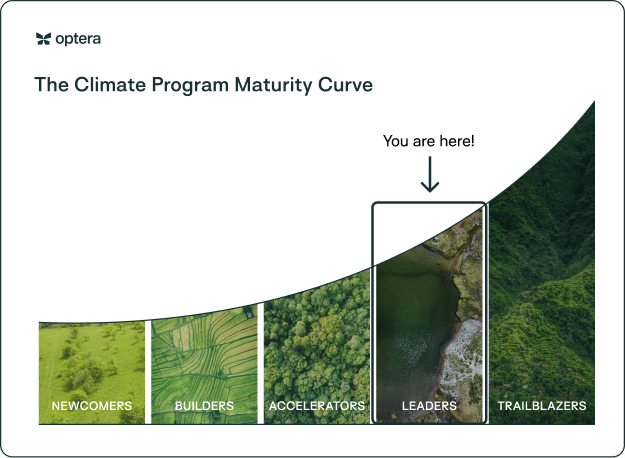You are a Leader!

You're a Leader! So what does that mean?
This is typically where time spent collecting emissions data and time spent driving reduction initiatives starts to even out. You have a decent process for collecting your scope 1, 2, and some scope 3 data and analyzing it to inform reduction plans. While data standards and requirements are always evolving, ideally your program is in a stage where you can focus more of your energy on meeting your targets.
Common signs of a program at the Leader level:
- You’re focused on calculating your most material scope 3 categories, starting to include primary data in addition to estimates.
- You’ve built internal alignment to have other departments more involved in your emissions management practice — both for data gathering and for prioritizing investments in reduction initiatives.
- You’re still oriented around an annual (or semi-annual) data collection and analysis cadence, rather than a more real-time approach.
To learn more about the entire climate program maturity curve framework, click the button below.
-
 BEST PRACTICES & TIPS FOR LEADERS
BEST PRACTICES & TIPS FOR LEADERS
Next best steps to become a Trailblazer
Here are three steps we suggest you take to drive maturity in your organization’s climate program:
SET SCOPE 3 TARGETS
If you haven’t already, commit to an SBT-aligned target for reducing your scope 1, 2, and 3 emissions — and publicly communicate your plans for reaching these goals.
GATHER CONTINUOUS DATA
Work to calculate and use your emissions data on an ongoing basis, not just as an annual exercise. This will allow you to track progress and leading indicators towards your goals throughout the year, rather than waiting to assess performance when the year is done. This level of data is needed for emissions data to drive ongoing business decisions.
COLLABORATE
Now that you’ve built internal alignment, look for opportunities to broaden your impact to the rest of your value chain. How can you incentivize and assist your suppliers, partners, and portfolio companies to set and meet their own reduction targets? How can you invest in new technologies and programs that will move the full industry forward?
-
 STORIES FROM YOUR LEADER PEERS
STORIES FROM YOUR LEADER PEERS
Dell gathers primary emissions data from suppliers
Dell Technologies determined that nearly half of their overall emissions came from their supply chain (scope 3, category 1). They gathered primary emissions and targets data from more than 90 percent of their suppliers to determine their category emissions and identify the biggest opportunities for supply chain decarbonization.
Crucially, they also worked with third-party auditors to validate their scope 3 emissions, a process made much smoother by clear methodology documentation and an easily auditable software platform.
Semiconductor manufacturer sets reduction strategy
A leading semiconductor manufacturer focused their 2023 efforts on calculating and modeling a pathway for an industry-leading 2040 Net Zero Science-Based Target.
Using past emissions performance, they set an ambitious scope 1, 2, and 3 emissions reduction strategy to meet that target. They also focused on getting their leadership team’s buy-in, resulting in the leadership team setting personal KPIs associated with completing their roadmap as planned.
-
 RELEVANT CONTENT FOR LEADERS
RELEVANT CONTENT FOR LEADERS
Content made with Leaders in mind
BLOGS
- Addressing Scope 3 Emissions
- How to get started with supplier-specific data
- Building a business case for supply chain emissions software
- Optera unlocks cradle-to-gate emissions allocations for supply chains
CLIENT STORIES
- Dell Improves Supply Chain Emissions Accuracy Using Supplier-Specific Data
- Hewlett Packard Enterprise Enhances Supply Chain Emissions Reduction Program – this is a great story about a company that successfully moved from Leader to Trailblazer!
VIRTUAL WORKSHOP
-
 GET HELP WITH YOUR PROGRAM
GET HELP WITH YOUR PROGRAM
Are you ready to become a Trailblazer?
When you’re ready to start committing to an SBT-aligned target for your full scope 1, 2, and 3 emissions, calculating your emissions on an ongoing basis, and/or assisting your supply chain partners in their decarbonization efforts, our team is here to help.
